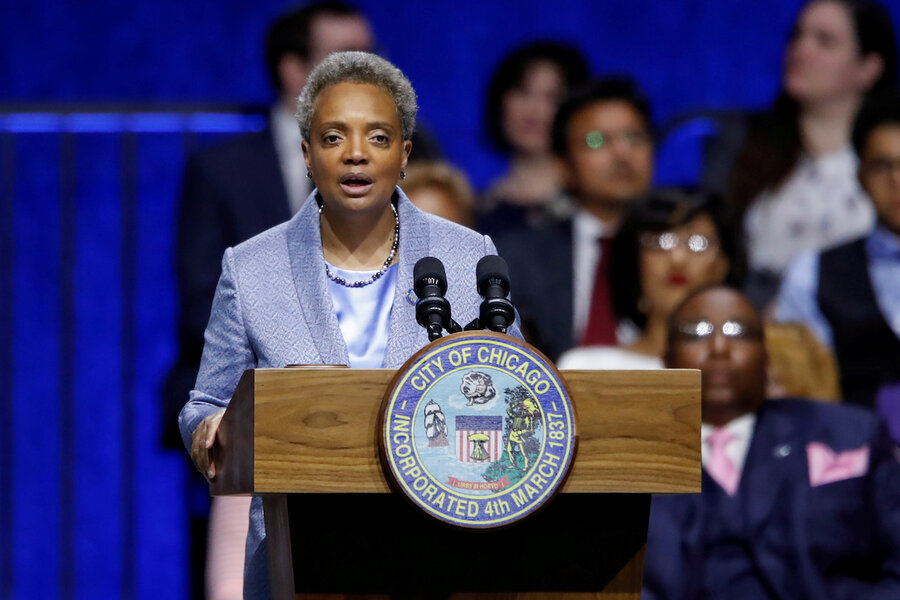Black women take US mayoral reins in record numbers
When Lori Lightfoot took office as mayor of Chicago in May, she became the city’s first black woman executive, as well as its first openly gay leader.
“Every child out there should know this: Each of you, one day, can be the mayor of Chicago,” Ms. Lightfoot said in her April 2 acceptance speech. “Want to know why? Just look right here.”
Black women have historically driven the American political agenda as organizers and as voters. Now, an increasing number are leading the biggest cities in the United States. In 2013, just one black woman was mayor of a major U.S. city, but black women today run seven of the nation’s 100 largest cities, including Washington, Atlanta, and San Francisco. (Women of color were also elected to lead in three Californian cities: Bakersfield, Chula Vista, and Fremont.) Their election victories and accomplishments in office mark a step forward in the push for equitable governance, experts say.
Why We Wrote This
Elected officials who represent a diversity of backgrounds are a key part of a healthy democracy, experts say. They are also well positioned to further the aim of equitable governance.
“What’s significant for me is the recognition that black women have always worked hard,” says Vi Lyles, the mayor of Charlotte, North Carolina, and the first black woman to hold that office there. “It’s just that perhaps this time we have the ability to show our strengths to a broader audience.”
Black women, who largely vote Democratic, went to the polls at higher rates than any other demographic group in the 2008 and 2012 presidential elections. And they played a key role in deciding 2018’s midterms. “We are now demanding a return on our voting investment,” says Glynda Carr, who co-founded Higher Heights, an organization that provides training and support to prospective black women candidates who identify as progressive.
“What we’ve demonstrated is that we don’t go to the polls alone,” Ms. Carr says. “When you fire up a black woman she brings her house, her block, her church, and her sorority.”
Black women’s political leadership has long been manifested in their involvement in the civil rights and women’s suffrage movements, says Andrea Benjamin, an associate professor of political science at the University of Oklahoma in Norman. “In their view of politics, the first thing isn’t ‘Oh I’m going to run for office.’ Their first inclination is ‘How can I serve? How can I help solve this problem?’”
What’s new is the form of black women’s leadership. Having officeholders with diverse backgrounds is a key component of a healthy democracy, according to Ms. Carr. “We make better decisions when our decision-making tables are diverse,” she says, adding that voters get excited to see candidates who look like them, as well as encouraging others of similar backgrounds to run.
Ms. Lyles says Higher Heights “really stepped up” in putting her and other black women candidates on a national platform in 2017. She also worked closely with Emily’s List, a political action committee that works to elect Democratic women in favor of abortion rights. The influence of black women candidates that year made enough waves to spark headlines like HuffPost’s “Is 2017 The Year Of The Black Woman Mayor?”
Black women candidates still face obstacles such as being outspent by their opponents, Ms. Carr says, although early endorsements usually help their campaigns. Representation still lags in statewide and federal offices, opponents of minority candidates often make “implicit appeals” to racial stereotypes, and voting still sometimes falls along racial lines, says Matthew Tokeshi, an assistant professor of political science at Williams College in Williamstown, Massachusetts.
But University of Florida professor of political science Sharon Austin says it is encouraging to see that black women have won even in cities like Chicago, where political structure has been “oftentimes very hostile toward African Americans.”
“I don’t think necessarily that the challenges are lessening,” says Dr. Austin, who is editing “Political Black Girl Magic: The Elections and Governance of Black Female Mayors,” forthcoming from Temple University Press. “I just think that these are women who are in positions of leadership [in their communities] and have been for many years, and they really care about these cities.”
Ms. Lyles retired from her first career in 2004, after nearly 30 years working for the city of Charlotte. But almost a decade later, when the city descended into a nasty political debate over the streetcar – proponents said it would help development, and critics said it was unreliable and costly to build – she knew her experience and skills as a facilitator could help her community. She won a city council seat in 2013 on a campaign of collaborative leadership, and since becoming mayor in 2017, she has worked to restore police-community relations and create affordable housing through public-private partnerships.
She says black women’s impact can continue to grow as they lead in communities of all sizes, whether as elected officials or otherwise.
“Maybe they don’t want to be in government,” Ms. Lyles says, “but if you can influence policy, if you can influence philanthropy, if you can influence government, we can change the way people see and view equity in this country.”







